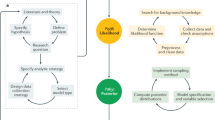Abstract
IN a recent letter, Heath and Linnett1 suggested for the treatment of molecular vibrations a new force field, the orbital valency force field. This is based more closely on modern ideas of directed valency than is the simple valency force field. We decided to test the orbital valency force field on methane, which is a convenient molecule to use, since all the deuterium-substituted methanes have been studied2. The first result obtained was that the original theory failed in this case. In particular, for CH4 and CD4, it was found that, to explain the frequencies of the doubly degenerate bending vibrations, a bending constant (kH/r2) of 1·35 × 105 dynes/cm, was required, whereas the triply degenerate bending vibrations needed a constant of 0·86 × 105 dynes/cm. Bending motions which are members of these two degenerate sets are shown in the accompanying drawings.
This is a preview of subscription content, access via your institution
Access options
Subscribe to this journal
Receive 51 print issues and online access
$199.00 per year
only $3.90 per issue
Buy this article
- Purchase on Springer Link
- Instant access to full article PDF
Prices may be subject to local taxes which are calculated during checkout
Similar content being viewed by others
References
Heath, D. F., and Linnett, J. W., Nature [161, 314 (1948)].
MacWood, G. E., and Urey, H. C., J. Chem. Phys., 4, 402 (1936). Benedict, W. S., Morikawa, K., Barnes, R. B., and Taylor, H. S., J. Chem. Phys., 5, 1 (1937).
Pauling, L., J. Amer. Chem. Soc., 53, 1367 (1931).
Author information
Authors and Affiliations
Rights and permissions
About this article
Cite this article
LINNETT, J., WHEATLEY, P. A Correlation between Molecular Vibrations and Bond-forming Orbitals. Nature 161, 971–972 (1948). https://doi.org/10.1038/161971b0
Issue Date:
DOI: https://doi.org/10.1038/161971b0
This article is cited by
-
Calculation of the structure and vibrational states for anionic forms of Co-, Ni-, and Cu-porphines
Journal of Applied Spectroscopy (2010)
-
Vibrational spectroscopic studies on the hofmann-Td-type clathrates: M(NH3)2M?(CN)4�2C6H6 (M=Mn or Cd and M?=Cd or Hg0
Journal of Inclusion Phenomena and Molecular Recognition in Chemistry (1994)
-
An infrared and Raman spectroscopic study of Td-type 4,4?-bipyridylcadmium(II) tetracyanometallate (II) benzene (1/2) clathrates: Cd(C10H8N2)Cd(CN)4 � 2C6H6 and Cd(C10H8N2)Hg(CN)4 � 2C6H6
Journal of Inclusion Phenomena and Molecular Recognition in Chemistry (1994)
Comments
By submitting a comment you agree to abide by our Terms and Community Guidelines. If you find something abusive or that does not comply with our terms or guidelines please flag it as inappropriate.



